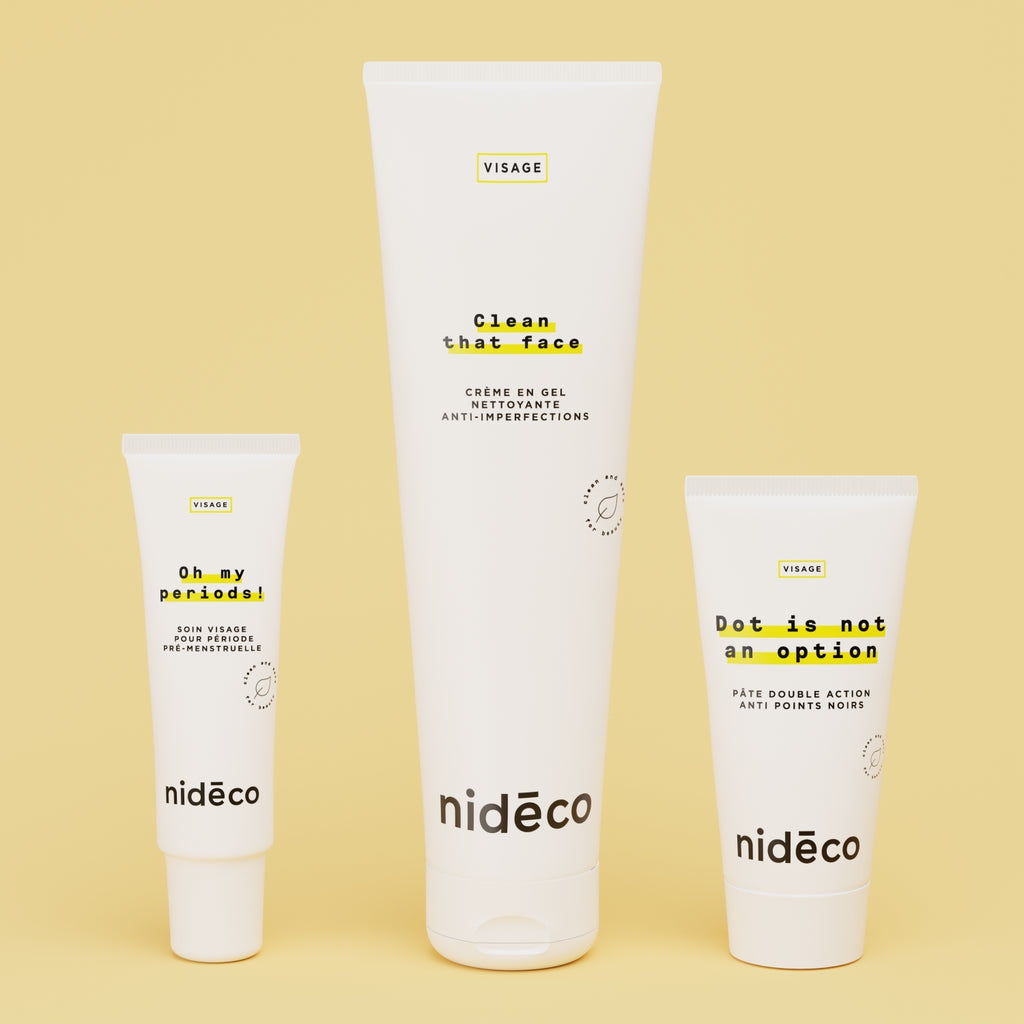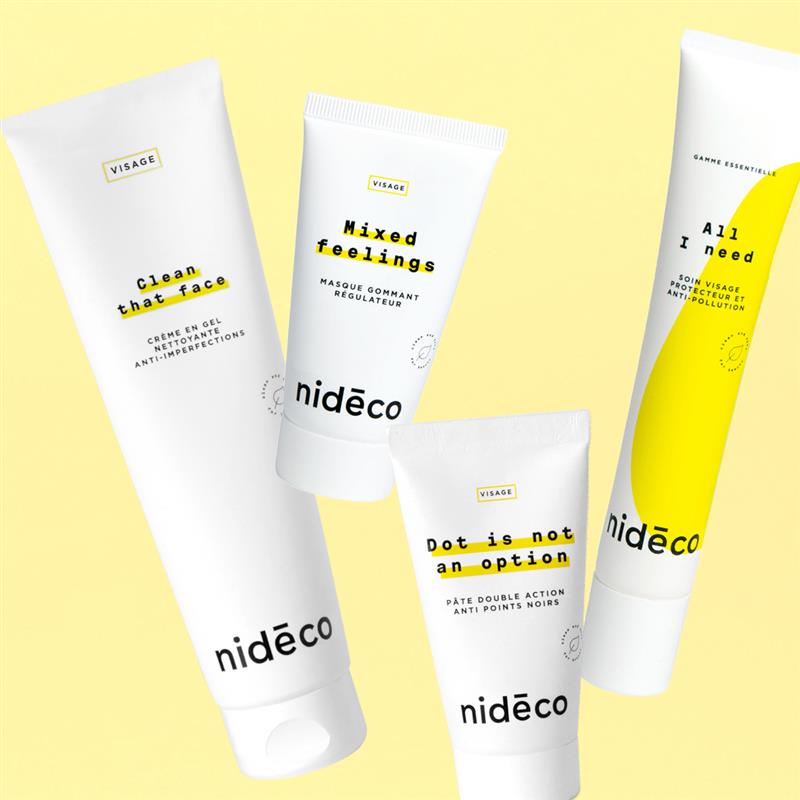Why does your face swell during the pre-menstrual period?

During the menstrual cycle, hormonal fluctuations directly influence the appearance and texture of the skin, especially on the face 😵💫. These variations in hormones, such as estrogen and progesterone, cause changes that can make skin oilier, drier, or even more prone to imperfections. That's why you'll need pre-menstrual skin care. But why exactly do these changes occur, and how can they affect our face, leading to symptoms such as swollen face during periods ?
How the menstrual cycle affects facial skin
The menstrual cycle is made up of four main phases, each influencing the skin in a different way. To understand how and why skin changes during menstruation, let's take a look at what happens at each stage of the cycle.
Week 1: Dryer, more reactive skin during menstruation
👉 At the start of your period, estrogen and progesterone levels drop considerably. This hormonal drop often leads to more sensitive, drier skin. During this phase, the production of prostaglandins increases, heightening sensitivity to pain and sometimes causing redness on the face. You may also notice that your complexion becomes duller, as blood circulation slows down during this period.
Some women find that their skin is more prone to blemishes and blemishes and irritation during menstruation, as the reduction in the skin's natural moisture content makes it more vulnerable to external aggression. For women prone to rashes or hormonal acne, this period can be particularly delicate.
Week 2: Ovulation, radiant skin
👉 As ovulation approaches, estrogen levels gradually increase, peaking at the moment of ovulation. It's during this phase that your skin is often at its best: it looks smoother, more hydrated, and more radiant. Estrogen stimulates fibroblasts, the cells that produce collagen and hyaluronic acid, boosting skin elasticity and hydration.
This is the ideal time to take care of your skin and provide it with extra nutrients. However, it's also important to prepare your skin for what's to come, as the progesterone hormones take over after ovulation.
Week 3: Progesterone and oily skin
👉 After ovulation, progesterone takes control. This hormone, essential for preparing the body for a possible pregnancy, has a stimulating effect on the sebaceous glands. This leads to increased sebum production, making the skin oilier. It's also during this phase that you may see pimples appear, due to the more dilated pores which favor the accumulation of sebum and dead cells.
Imperfections are common during this period, especially for those suffering from hormonal acne. Skin can also become shinier and difficult to mattify.
Week 4: Hormonal decline, more sensitive skin
👉 As your period approaches, progesterone and estrogen levels drop again. This drop can cause noticeable changes in the texture and appearance of your skin. It becomes drier, more sensitive and prone to redness. It's also at this time that some women notice a swollen face during menstruationThis is a direct consequence of hormonal changes, which can lead to water retention and facial swelling.
Skin inflammation is common during this phase, especially if you already suffer from reactive skin. Prostaglandins, already mentioned for their role in pain sensitivity, can also accentuate redness and inflammation.
Swollen face during menstruation: how to avoid it?
The swelling of the face during menstruation is often linked to water retention caused by hormonal fluctuations 💧. Here are a few tips to prevent this phenomenon or at least reduce it:
- Drink plenty of water : It may seem counterintuitive, but drinking water helps eliminate excess sodium in the body, reducing water retention and swelling.
- Reduce salt intake Too much salt can increase water retention, which can lead to facial swelling. Try to limit your sodium intake, especially before and during your period.
- Sleeping with your head elevated This can help reduce swelling by facilitating the circulation of fluids in the body.
- Apply cold compresses If you wake up with a swollen face, apply cold compresses to your face for a few minutes to reduce inflammation.
Our advice made in Nidéco :
🧼 If there is an overproduction of sebum, cleanse your skin daily with a gentle cleanser to avoid aggression (which could accentuate the oily skin effect) 👉 Clean that face
❌ If you have pimples that appear in spite of everything, don't touch them (we can't stress this enough). This is essential to avoid scarring and worsening the infection, irritation and inflammation.
🚰 Wood (water)! Hyper-helpful for hydrating your skin properly and eliminating toxins more easily.
💃🏻 If your spm leaves you a little respite, do some sport ! You sweat and immediately cleanse your skin = you cleanse your pores.
Find out what to do when your skin is undergoing hormonal changes
Sarah came up with the idea for Oh my Periods! skincare: specifically developed to target hormonal acne, this dedicated facial will protect skin flora thanks to a cocktail of prebiotics ❤️.
Its melting, rebalancing gel-cream texture guarantees a feeling of comfort before the menstrual period, with skin protected from external aggression, soothed and matified, and less inflamed.
Helps facial skin cope with the upheavals associated with the pre-menstrual period: tired features, excess sebum, proliferation of pimples and blackheads, dilated pores, more delicate skin.
COCKTAIL OF ASSETS
We have rigorously selected the most effective clean active ingredients in this skincare product for optimum effectiveness 👊🏼 (👉 customer reviews)
Sea sugars
- They increase the barrier functions of the skin
By allowing a significant increase in proteins linked to the cohesion of the horny layer, they participate in the formation of a barrier of better quality and an activation of the renewal of the skin.
- They improve the appearance of the skin
By boosting cell renewal, they remove dead skin cells from the surface of the skin, making the skin less rough, softer and smoother.
- They reduce inflammation
They boost the skin's immunity while reducing the chain reactions that lead to inflammation. They visibly inhibit the growth of pro-acne bacteria and reduce skin reactivity.
- They keep the skin well hydrated
By stimulating the synthesis of hyaluronic acid and by their positive action on the skin's hydric memory function, they support the skin's ability to rehydrate.
Pre-biotics
Want to know what prebiotics are used for? Click here.
- They maintain the good balance of the skin flora
By its microbiological action, they stimulate the saprophyte flora to the detriment of the opportunistic, undesirable or even pathogenic flora.
- They stimulate the skin's natural defenses
Through its biological action, they stimulate the release of antimicrobial peptides, thus boosting the skin's natural defenses, making it healthier.
Conclusion
Hormonal fluctuations linked to the menstrual cycle directly influence the appearance of facial skin. These changes can lead to dryness, oily skin, blemishes and even a swollen swollen face during menstruation. However, with the right gestures and products, it's possible to minimize these undesirable effects and help your skin get through these periods of hormonal upheaval. ❤️






























